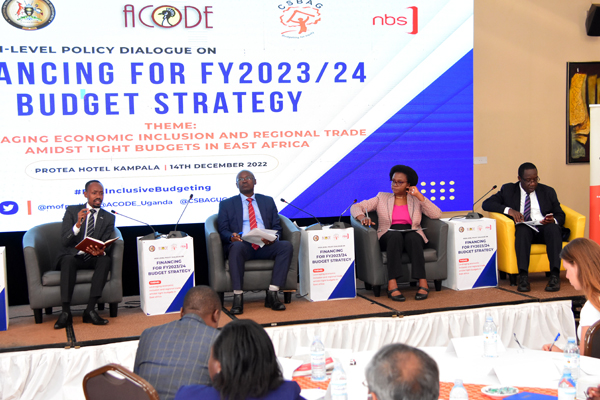Prime
Experts weigh in on budget financing

Left to right: Director of Policy and Business Development at Private Sector Foundation Uganda, Mr Julius Byaruhanga, Ag Commission Secretary in Local Government Finance Commission, Mr Adam Babale, Senior Economist at World Bank, Ms Rachel Sebudde and the Chairperson of the Finance Committee in Parliament, Mr Keefa Kiwanuka during a panel discussion at the high level meeting on budget financing for Financial year 2023/24 budget in Kampala on December 14, 2022. PHOTO/FRANK BAGUMA
What you need to know:
- Economists advise the government to focus on areas with a competitive advantage.
Experts and development partners have recommended minimising expenditure and prioritising investments in productive programmes and sectors that will trickle growth to the grassroots to help the country generate revenue to finance its budget.
Other recommendations include exploiting regional trade, increasing access to international markets, and industrialisation, among others.
Addressing a meeting in Kampala yesterday on budget financing for the FY2023/2024 year, Mr Julius Mukunda, the executive director of the Civil Society Budget Advocacy Group, said investments should be made in areas where the country has a competitive advantage.
“We have agencies duplicating services and Parliament should save us on this,” he said, adding that the Public Service Commission, which is mandated to recruit public servants, does the same work as the Education and Health Service Commissions.
Mr Jemba Kanakulya Mulondo, the deputy spokesperson of Kampala City Traders Association, concurred with Mr Mukunda, saying: “We can’t sustain 83 ministers, more than 500 MPs, over 135 districts that come with Resident City Commissioners and deputy Resident District Commissioners. This comes with additional expenditure.”
Mr David Bahati, the State minister of Trade and Cooperatives, said despite the effects of the Covid-19 pandemic and Russia-Ukraine war, the government is intentional about prioritising industry and manufacturing.
To underline the value the government attaches to industrialisation, Mr Bahati cited the increase of Uganda Development Corporation’s capitalisation from Shs500 billion to Shs5 trillion.
He said the additional financing is to ensure that the corporation starts processing in areas where the private sector has little appetite such as processing cassava into starch as well as cocoa.
Mr Bahati said an embargo on new administrative units has since been established to rein in on the cost of administration .
He also said the current contribution of the industrial sector to the country’s Gross Domestic Product (GDP) stands at 27.1 percent.
Mr Bahati further noted that the private sector should be helped to improve the quality of its output.
The minister also called for import substitution and export promotion so that the country can recover faster from recent economic shocks.
The executive director of Advocates Coalition for Development and Environment (ACODE) , Dr Arthur Bainomugisha, said the fact that more than 50 percent of Uganda’s budget is funded externally shouldn’t be treated lightly.
“We should invest in productive sectors such as tourism, infrastructure, human capital development to create people who have skills and knowledge to create wealth,” Dr Bainomugisha said.
“How do we exploit opportunities in regional integration, exploit inter-continental free trade agreement, opportunities in regional integration, work together to support an African-led Peace Initiative on DR Congo to create a peaceful environment for trade?” he added.
Mr Dickson Kateshumbwa, the chairperson of the Parliamentary Forum on Public Finance Management, called for the expediting the implementation of programmes that support people at the grassroots but defended expenditure on MPs. “It is the people who have been putting pressure on the government to create administrative units because of the aspect of social harmony and democracy,” he said.
A senior economist at the World Bank, Ms Rachel Sebudde, said adding value and finding niches of products that other countries are not producing are key to diversifying revenue streams for the government.




